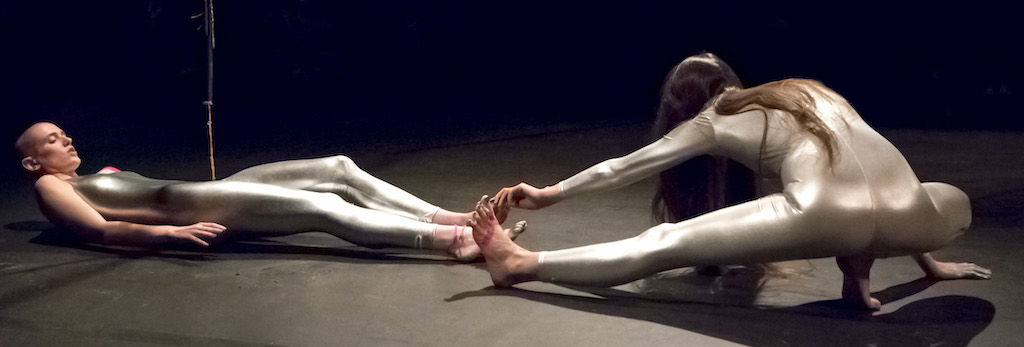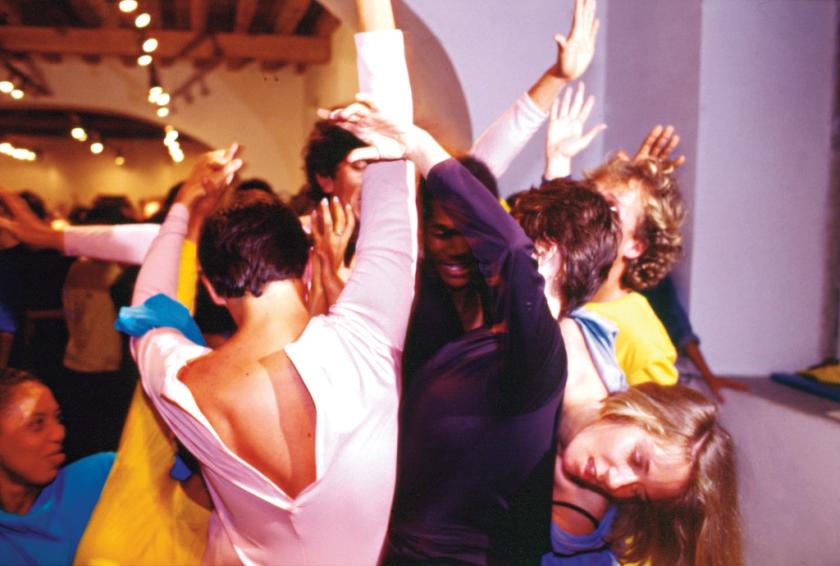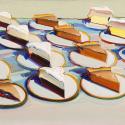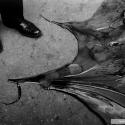Brazilian artist Lygia Clark is best known for taking her abstract sculptures off the pedestal and inviting people to interact with them. Dozens of constructions named Bichos (Beasts or Critters) (pictured below right) are hinged along the joins to allow you to rearrange the parts in seemingly endless configurations.
In the late 1960s her democratic approach may have been ground breaking, but now the novelty has worn off, it’s hard to get excited about creating this or that composition of steel shapes when all arrangements are equally acceptable and nothing is at stake.
 From malleable sculptures, examples of which are on show at the Whitechapel, the artist moved on to collecting and making things specifically to be worn or handled. You are invited to fondle pebbles or explore möbius strips and polythene bags full of shells, air or a pan scourer. Clark may have pioneered the idea, but exercises like these have since become commonplace in schools and somatic workshops, so it’s hard to rekindle the enthusiasm that experiences like this may once have generated.
From malleable sculptures, examples of which are on show at the Whitechapel, the artist moved on to collecting and making things specifically to be worn or handled. You are invited to fondle pebbles or explore möbius strips and polythene bags full of shells, air or a pan scourer. Clark may have pioneered the idea, but exercises like these have since become commonplace in schools and somatic workshops, so it’s hard to rekindle the enthusiasm that experiences like this may once have generated.
The artist was also keen to explore group dynamics. Corpo Coletivo (Collective Body) 1974 (main picture) invites a group of people to discover how to connect while entangled in a large net or wearing costumes sewn together in unexpected places so that “normal” relations are impossible and new ones have to be negotiated. I find these provocations far more interesting since they stimulate human interaction and require participants to develop sensitivity to others. Sadly, though, the public is invited to watch rather than take part, which is a bit like putting Clark’s sculptures back on their pedestals with a notice reading “Hands Off". One of the performers tells me, though, that brave members of the public are joining them under the net.
 Sonia Boyce’s Do You Want To Touch? 1993 was inspired by Lygia Clark’s special interest in touch. Attached to a large sculptural structure are strands and clumps of actual and fake hair which you are welcome to feel. Given that having one’s hair touched can be a sensitive issue, especially for black people when the idly curious are white, this is fruitful territory; but how to explore it without actually infringing on anyone’s personal space or disrespecting their autonomy is a difficult question. Offering whole heads of hair rather than fragments and snippets could more readily, perhaps, provoke the experience of transgressing boundaries and breaking taboos, which I guess is the goal of the piece.
Sonia Boyce’s Do You Want To Touch? 1993 was inspired by Lygia Clark’s special interest in touch. Attached to a large sculptural structure are strands and clumps of actual and fake hair which you are welcome to feel. Given that having one’s hair touched can be a sensitive issue, especially for black people when the idly curious are white, this is fruitful territory; but how to explore it without actually infringing on anyone’s personal space or disrespecting their autonomy is a difficult question. Offering whole heads of hair rather than fragments and snippets could more readily, perhaps, provoke the experience of transgressing boundaries and breaking taboos, which I guess is the goal of the piece.
In the video Exquisite Tension, 2005 (pictured above left) a black woman and white man sit side by side while their hair is braided into a single plait. I’m reminded of Relation in Time, 1977 a performance in which Ulay and Abramovic sat back to back for 16 hours inextricably bound together by their plaited hair. Boyce has added a further dimension by introducing different hair types that don’t easily mesh and her participants seem disenchanted by the effort required to form a satisfactory bond.
 We move in her way 2017 (pictured above) is a seven screen video installation recording an event at the ICA in which performers and audience members were invited to interact with one another and various textile hangings. An extended improvisation like this may be fascinating for those involved, but capturing on video the experience of actually being present as the unexpected unfolds is virtually impossible. Inevitably, perhaps, the recording lacks the tensions as well as the surprises and nuances of the actual moments.
We move in her way 2017 (pictured above) is a seven screen video installation recording an event at the ICA in which performers and audience members were invited to interact with one another and various textile hangings. An extended improvisation like this may be fascinating for those involved, but capturing on video the experience of actually being present as the unexpected unfolds is virtually impossible. Inevitably, perhaps, the recording lacks the tensions as well as the surprises and nuances of the actual moments.
- Lygia Clark and Sonia Boyce are at the Whitechapel Gallery until 12 January
- More visual arts reviews on theartsdesk










![SEX MONEY RACE RELIGION [2016] by Gilbert and George. Installation shot of Gilbert & George 21ST CENTURY PICTURES Hayward Gallery](/sites/default/files/styles/thumbnail_125_x_125_/public/mastimages/Gilbert%20%26%20George_%2021ST%20CENTURY%20PICTURES.%20SEX%20MONEY%20RACE%20RELIGION%20%5B2016%5D.%20Photo_%20Mark%20Blower.%20Courtesy%20of%20the%20Gilbert%20%26%20George%20and%20the%20Hayward%20Gallery._0.jpg?itok=3oW-Y84i)




Add comment